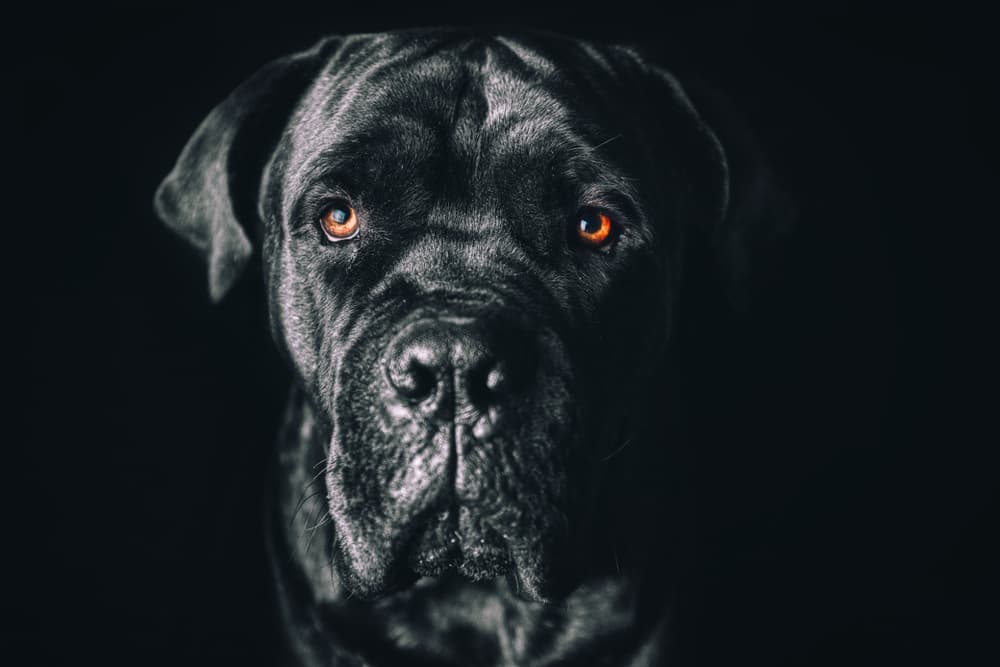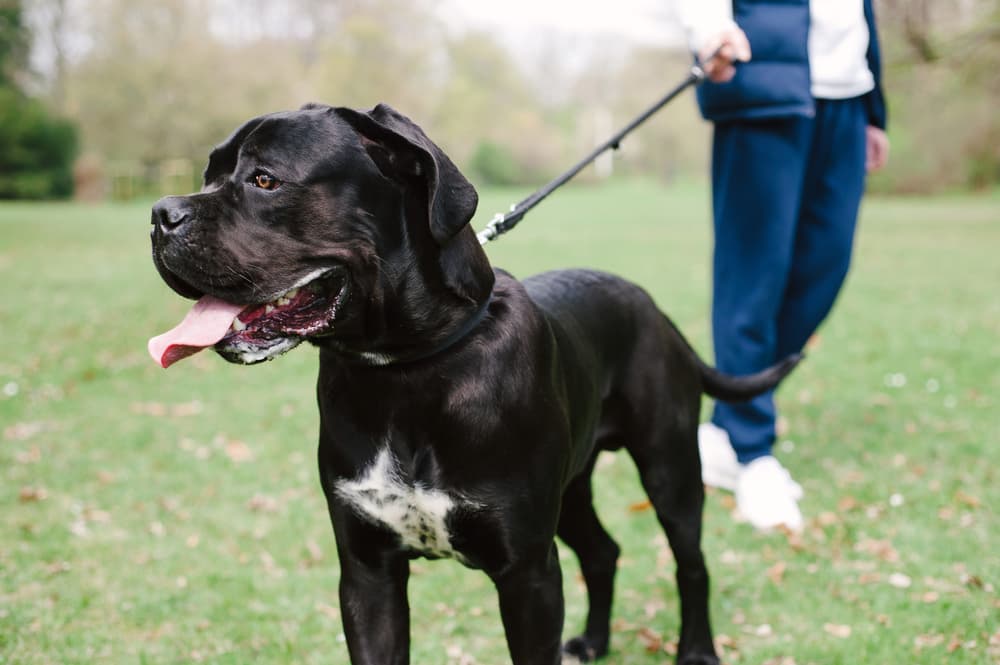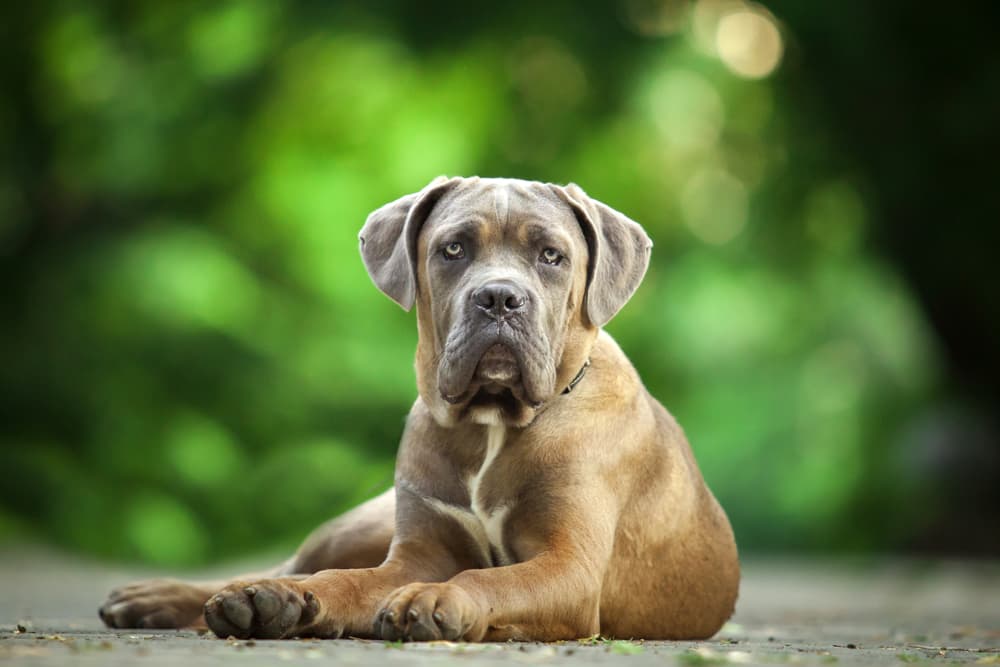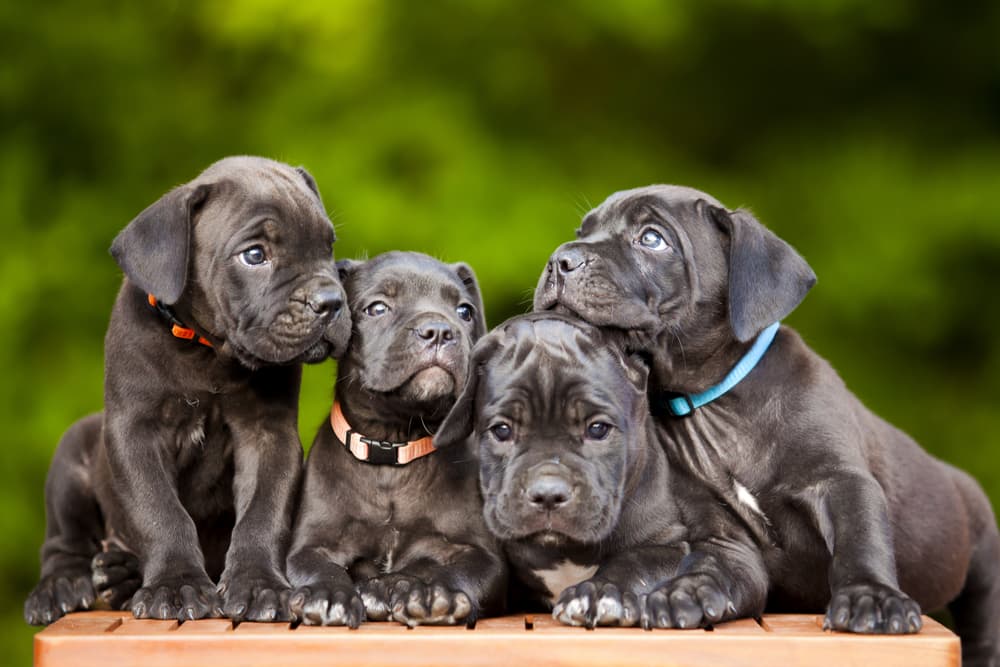Cane Corso

Breed Details
-
Key Personality Traits:
Loyal
Active
Protective
Breed Characteristics
Adaptability
Affectionate
Apartment Friendly
Barking Tendencies
Cat Friendly
Child Friendly
Dog Friendly
Excercise Needs
Grooming
Health Issues
Intelligence
Energy Level
Shedding Level
Social Needs
Stranger Friendly
Territorial
Trainability
Watchdog Instincts
This Italian Mastiff was bred to hunt wild boar and today acts as a guard dog. Fiercely devoted to his family, he doesn’t care for strangers or small animals. More athletic and agile than other Mastiffs, a Cane Corso will sit at your feet with impressive weight.
The Cane Corso is a Mastiff breed from Italy. He is a complex, powerful dog with special needs. For starters, he is a giant breed, weighing up to 120 pounds. He was created to hunt big game and guard property. The Cane Corso has a massive head, heavy rectangular body, and a short coat in black, gray, fawn, or red.
The Cane Corso is not an appropriate choice for an inexperienced dog owner. First-time dog owners and people who have had only “soft” breeds such as Retrievers, Spaniels, or toy breeds need not apply. This dog is large, powerful, intelligent, active, and headstrong.
A Cane Corso needs a leader who can guide him with firmness and consistency without using force or cruelty. The Cane Corso loves his family, but he doesn’t always demonstrate that affection in an obvious way. He will want to be near you, but he’s not demanding in terms of attention or physical touch.
Early, frequent socialization is essential. Purchase a Cane Corso puppy from a breeder who raises the pups in the home and ensures that they are exposed to many household sights and sounds. Continue socializing your Cane Corso throughout his life by taking him to puppy kindergarten class, introducing him to friends and neighbors, and planning outings to local shops and businesses. This is the only way he can learn to be discriminating between what is normal and what is truly a threat.
However, even with the right amount of socialization Cane Corsos may not fully warm up to people other than his family. The Cane Corso is first and foremost a guard dog, and he takes his responsibilities seriously.
The Cane Corso has a moderate activity level and needs a job to do, which can be anything from being your on-leash walking companion to daily training activities. Expect to walk or jog him at least a mile daily, in addition to 20 minutes or so of training practice. He will not be satisfied to lie around and do nothing all the time.
The Cane Corso has a high prey drive and a territorial nature, so a strong, solid fence at least six feet high is recommended to keep him on his own property. An underground electronic fence is never appropriate for this breed.
Like any dog, Cane Corso puppies are inveterate chewers and because of their size can do a whole lot of damage. Make sure to puppy-proof your home and don’t give them the run of the house until they’ve reached a trustworthy level. Keep your Cane Corso puppy busy with training, play, and socialization experiences. A bored Cane Corso is a destructive Cane Corso.
The Cane Corso has a smooth coat that sheds. Brush him at least once a week to remove dead hair and keep the skin and coat healthy. Clean the ears and trim the nails as needed, and bathe the Cane Corso on the rare occasions that he’s dirty.
Other Quick Facts
- Despite a multi-century legacy, the Cane Corso nearly went extinct during World War II.
- The Cane Corso is a fiercely intelligent animal and requires an equally savvy owner.
The History of the Cane Corso

Italy is the birthplace of two Mastiff-type breeds: the Neapolitan Mastiff and the Cane Corso. Both descend from Roman war dogs. The Cane Corso could be considered “light artillery” to the Neo’s “howitzer.” After the fall of the Roman Empire, he worked as a farmhand, flock guardian, property and family guardian, and hunting dog (especially of big and dangerous game such as wild boar).
Industrialization brought the decline of the Cane Corso, and World Wars I and II nearly brought about the breed’s extinction. By the 1970s, only a few of the dogs remained in remote areas of southern Italy. Dr. Paolo Breber took an interest in the breed when it was brought to his attention in 1973 by Giovanni Bonnetti, who remembered the dogs from his childhood. In the following year, Breber acquired some of the dogs and began a breeding program, which garnered interest from others when the dogs were pictured in a magazine article. By 1996, the breed had achieved recognition by the Federation Cynologique Internationale.
At that time, some of the dogs had been brought to the United States. The International Cane Corso Federation was formed in the U.S. in 1993, and more dogs were imported from Italy. The ICCF elected to seek the breed’s recognition by the American Kennel Club in 2003 and changed its name to the Cane Corso Association of America. The breed achieved recognition in 2010 and ranks 51st among the dogs registered by AKC.
Cane Corso Temperament and Personality

The Cane Corso is a naturally strong-willed dog with a dominating personality. Those characteristics are what make him an exceptional protector of his family and home. However, his natural tendency to take charge can be troublesome to an owner who is unable to establish his or her role as pack leader and control this behavior. While the Cane Corso is loving and affectionate with his family, including children, he will try to rule the roost. Anyone considering this breed must be prepared to set boundaries with confidence because this dog will surely test them.
The Cane Corso is highly intelligent and athletic, and he needs plenty of activity to keep him fit physically and mentally. Take him jogging or on strenuous hikes to help him burn off his energy.
The Cane Corso may be best suited to a family with older children (age 9 and up) rather than a family with babies and toddlers due to his large size and the time and effort required to closely supervise interactions between the dog and young children.
Start training your Cane Corso puppy the day you bring him home. Even at 8 weeks old, he is capable of soaking up everything you can teach him. Don’t wait until he is 6 months old to begin training or you will have a more headstrong dog to deal with. If possible, get him into puppy training classes by the time he is 10 to 12 weeks old, and socialize, socialize, socialize.
However, be aware that many puppy training classes require certain vaccines (like kennel cough) to be up to date, and many veterinarians recommend limited exposure to other dogs and public places until puppy vaccines — including rabies, distemper and parvovirus (DHPP vaccine) — have been completed. In lieu of formal training, you can begin training your puppy at home and socializing him among family and friends until puppy vaccines are completed.
Don’t let him get away with behaviors such as growling or snapping when he is touched or moved, or when he doesn’t want to go outside or go in a certain direction on leash. Nor should he be allowed to behave that way when someone gets too close to his toys or food. To prevent these types of behaviors in the first place, work closely with a trainer or behaviorist who understands the mindset of guardian breeds and who offers positive-reinforcement training methods.
Talk with a reputable, experienced Cane Corso breeder. Describe exactly what you’re looking for in a dog and ask for assistance in selecting a puppy. Breeders see the puppies daily and can make uncannily accurate recommendations once they know something about your lifestyle and personality. Choose a puppy whose parents have nice personalities and who has been well socialized by the breeder from birth.
What You Need to Know About Cane Corso Health

All dogs have the potential to develop genetic health problems, just as all people have the potential to inherit disease. A reputable breeder will be honest and open about health problems in the breed and the regularity with which they occur in her lines.
Some of the health conditions that have been seen in the Cane Corso are:
- Hip dysplasia
- Eye problems (such as entropion or ectropion)
- Demodectic mange
- A tendency toward gastric torsion (also known as bloat in dogs)
Ask the breeder to show evidence that a puppy’s parents have hip evaluations of excellent, good, or fair from the Orthopedic Foundation for Animals (OFA) or hip scores from the University of Pennsylvania (PennHIP) as well as eye clearances from the Canine Eye Registry Foundation. Do not purchase a puppy from a breeder who cannot provide you with written documentation that the parents were cleared of health problems that affect the breed.
Another thing that Cane Corso parents should watch for is obesity. Keeping a Cane Corso at an appropriate weight is one of the easiest ways to extend his life.
The Basics of Cane Corso Grooming
Grooming the Cane Corso is quite easy due to his short coat, though his large size means it’s a big job. Brush his sleek coat with a natural bristle brush or mitt once a week. Use coat conditioner/polish to brighten the sheen. Bathe him every three months (or when he’s dirty) using a mild shampoo.
The rest is basic care. Check his ears every week and clean if needed. Trim his toenails regularly, usually once a month, and brush his teeth regularly using a soft toothbrush and doggie toothpaste to keep his teeth and gums healthy. It is essential to introduce grooming to the Cane Corso when he is very young so he learns to accept the handling and stay calm during bathing and grooming.
Choosing a Cane Corso Breeder

Finding a good breeder is the key to finding the right Cane Corso puppy. A good breeder will match you with the best dog for you and will, without question, have done all of the certifications necessary to screen out health problems as much as possible. She should be more interested in placing pups in the right homes than making big bucks. Be wary of breeders who tell you only good things about the breed or who promote the dogs as being “good with kids” without any context.
Good breeders will welcome your questions about temperament, health clearances, and what the dogs are like to live with, and will come back at you with questions of their own about what you’re looking for in a dog and what kind of life you can provide for him. A good breeder can tell you about the history of the breed and discuss what health problems affect the breed and the steps she takes take to avoid those problems. A breeder should want to be a resource for you throughout your dog’s life.
Look for more information about the Cane Corso and start your search for a good breeder at the website of the Cane Corso Association of America. Choose a breeder who has agreed to abide by the CCAA’s code of ethics, which prohibits the sale of puppies to or through pet stores and calls for the breeder to obtain recommended health clearances on dogs before breeding them.
Avoid breeders who seem interested only in how quickly they can unload a puppy on you and whether your credit card will go through. Breeders who offer puppies at one price “with papers” and at a lower price “without papers” are unethical. You should also bear in mind that buying a puppy from websites that offer to ship your dog to you immediately can be a risky venture, as it leaves you no recourse if what you get isn’t exactly what you expected.
While many reputable breeders have websites, watch for potential warning signs. If breeders have multiple litters available or let you pay online with a credit card, consider a different dog breeder.
Before buying a Cane Corso puppy from a breeder, do plenty of research about the breed, try to visit the facility in person and make sure to ask plenty of questions. Your veterinarian can also be a resource in helping you locate a reputable breeder to find a healthy puppy.
The cost of a Cane Corso puppy varies depending on the breeder’s locale, whether the pup is male or female, what titles his parents have, and whether he is best suited for the show ring or comfy home. The puppy you buy should have been raised in a clean home environment and come from parents with health clearances. Puppies should be temperament tested, vetted, dewormed, and socialized to give them a healthy, confident start in life.
Before you decide to buy a puppy, consider whether an adult Cane Corso might better suit your needs and lifestyle. An adult dog may already have some training and will probably be less active, destructive, and demanding than a puppy. With an adult, you know more about what you’re getting in terms of personality and health and you can find adults through breeders or shelters. If you are interested in acquiring an older Cane Corso through breeders, make sure the dog has been properly socialized and trained. If you want to adopt a dog, read the advice below on how to do that.
Adopting From a Rescue or Shelter

There are many great options available if you want to adopt this dog breed from an animal shelter or breed rescue organization. Here is how to get started.
Browse dog adoption websites. Adoption directories like Petfinder.com and Adopt-a-Pet.com can have you searching for a Cane Corso in your area in no time. The sites allows you to be very specific in your requests (house-training status, for example) or very general (all the Cane Corso dogs available on Petfinder across the country). Animal Shelter.org can help you find animal rescue groups in your area. Also, some local newspapers have a “pets looking for homes” section you can review.
Look on social media. Social media is another great way to find a dog. Post on your Facebook page or Instagram that you are looking for a specific breed so that your entire community can be your eyes and ears. You may even be able to connect with a local shelter or breed-specific rescue who can alert you if a Cane Corso becomes available for adoption.
Reach out to local experts. Start talking with all the pet pros in your area about your desire for a Cane Corso. That includes vets, dog walkers, and groomers. When someone has to make the tough decision to give up a dog, that person will often ask her own trusted network for recommendations.
Talk to breed rescues. Most people who love Cane Corso dogs love all Cane Corsi. That’s why breed clubs have rescue organizations devoted to taking care of homeless dogs. The Cane Corso Association of America‘s rescue network can help you find a dog that will be the perfect companion for your family. You can also search online for other breed-specific rescues in your area.
The great thing about breed rescue groups is that they tend to be very up front about any health conditions the dogs may have and are a valuable resource for advice. They also often offer fostering opportunities so, with training, you could bring a Cane Corso home with you to see what the experience is like.
Key Questions to Ask Before Adopting a Cane Corso
You now know the things to discuss with a breeder, but there are also questions you should discuss with shelter or rescue group staff or volunteers before you bring home a dog. These include:
- What is his energy level?
- How is he around other animals?
- How does he respond to shelter workers, visitors and children?
- What is his personality like?
- What is his age?
- Is he house-trained?
- Has he ever bitten or hurt anyone that they know of?
- Are there any known health issues?
Whether he’s a puppy or adult, take your dog to your veterinarian soon after adoption. Your veterinarian will be an important resource in your dog’s life and can help you spot or prevent health problems.
Cane Corso Dog Breed FAQs
Do Cane Corsos shed?
The Cane Corso does shed, but not as badly as other dogs with longer or fuller coats. The breed does have a double-layered coat and does shed throughout the year. With Cane Corsos, you’ll find shedding is more prominent in the spring. Weekly brushing is recommended to help during time of heavy shedding.
How big does a Cane Corso get?
The Cane Corso is a giant breed, so they are very large dogs. Their height ranges from 23 inches to 27 inches, with males being larger than females. Many of these dogs weigh just under or over 100 pounds.
Are Cane Corso dogs aggressive?
Cane Corso dogs are known as guard dogs and they can become aggressive, protective, and territorial without the proper training and socialization. They are affectionate with and loyal to their family members, but may not warm up to strangers quickly. To keep Cane Corso dogs from becoming aggressive, make sure they receive early training using positive-reinforcement methods and socialize them with people and other pets at an early age.
How long do Cane Corsos live?
They typically live between 9 and 12 years and their lifespan depends on their genetics and overall health. Keeping up with regular vet appointments, keeping them at a healthy weight, and understanding their genetic history can help you extend your dog’s life.
Cane Corso Pictures

















